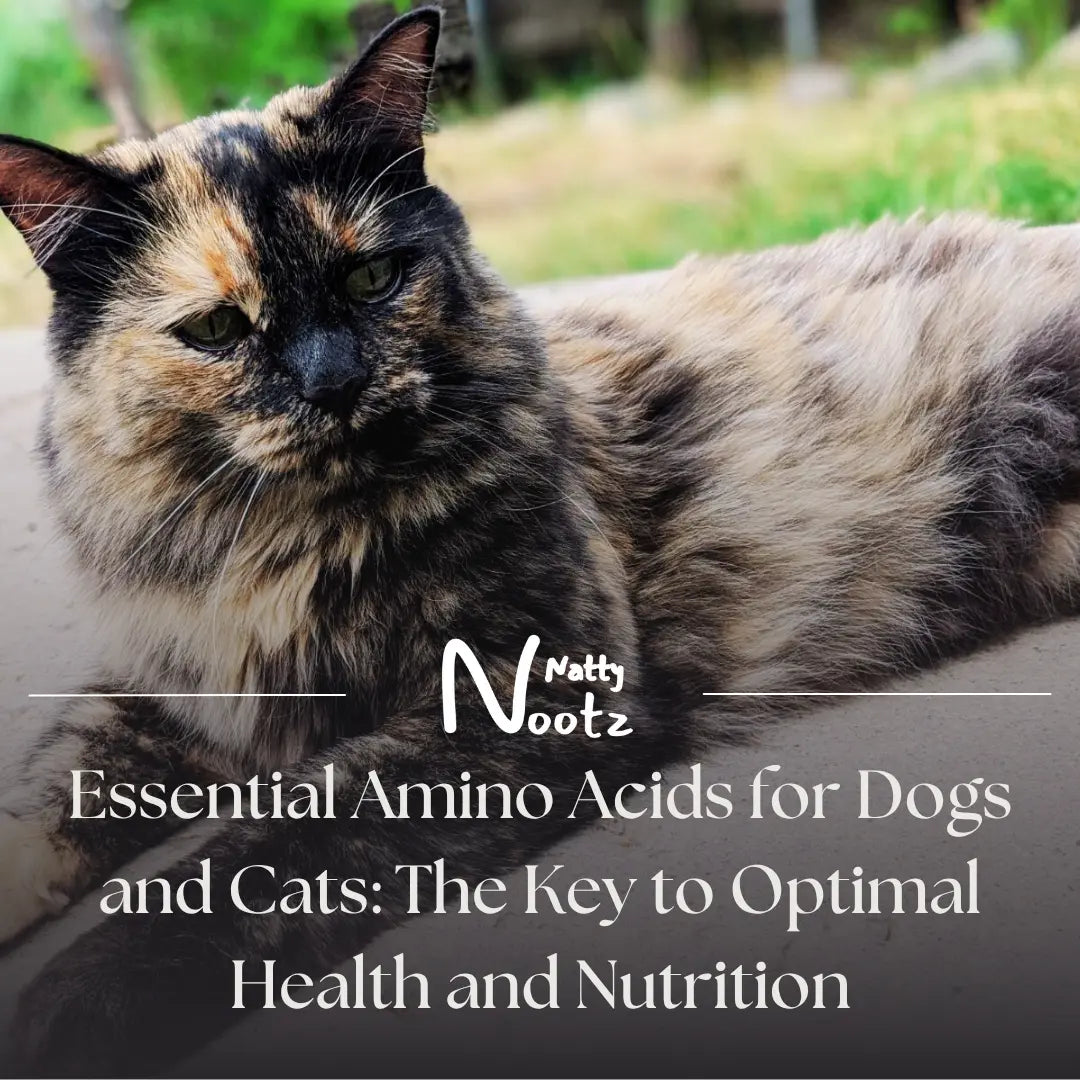No Code Necessary

Understanding the Essential Amino Acids for Dogs and Cats
Proper nutrition is fundamental to the health and vitality of pets. At the core of their dietary needs are essential amino acids, the building blocks of proteins that support growth, maintenance, and overall well-being. Dogs require ten essential amino acids, while cats need eleven to thrive. These amino acids cannot be synthesized by their bodies and must be supplied through diet.
The Ten Essential Amino Acids for Dogs
For dogs, the following amino acids are critical for optimal health:
-
Arginine – Removes ammonia from the body and supports immune health.
-
Histidine – Vital for hemoglobin production and tissue repair.
-
Isoleucine – Supports muscle recovery and energy production.
-
Leucine – Aids in protein synthesis and muscle preservation.
-
Lysine – Promotes calcium absorption, collagen formation, and growth.
-
Methionine – Crucial for skin, fur health, and detoxification.
-
Phenylalanine – Key to hormone production and brain function.
-
Threonine – Supports digestion, immune response, and muscle function.
-
Tryptophan – Essential for serotonin production and mood regulation.
-
Valine – Important for energy production and muscle coordination.
The Eleven Essential Amino Acids for Cats
Cats, as obligate carnivores, have unique dietary needs and require an additional amino acid, taurine, for optimal health. The eleven essential amino acids for cats are:
-
Arginine – A critical amino acid that supports the urea cycle and helps remove toxins.
-
Histidine – Necessary for tissue repair and hemoglobin production.
-
Isoleucine – Contributes to muscle development and energy metabolism.
-
Leucine – Promotes protein synthesis and muscle preservation.
-
Lysine – Supports calcium absorption and overall growth.
-
Methionine – Important for skin, fur health, and liver detoxification.
-
Phenylalanine – A precursor for melanin, crucial for pigmentation and hormonal function.
-
Threonine – Involved in immune function and proper digestion.
-
Tryptophan – Aids in stress relief and serotonin regulation.
-
Valine – Essential for muscle coordination and energy balance.
-
Taurine – Vital for heart health, vision, and reproductive function.
Foods Rich in Essential Amino Acids for Dogs and Cats
To meet the amino acid requirements of dogs and cats, pet owners can incorporate a variety of nutrient-dense foods into their diets. Below is a detailed list of foods rich in essential amino acids:
Protein-Rich Foods for Dogs and Cats
-
Chicken – A lean protein source containing all essential amino acids, ideal for muscle maintenance.
-
Beef – High in leucine, lysine, and methionine, supporting energy and tissue repair.
-
Turkey – Offers a well-balanced amino acid profile with high levels of tryptophan.
-
Fish (Salmon, Tuna, Mackerel) – Packed with taurine, methionine, and omega-3 fatty acids, excellent for cats’ vision and heart health.
-
Lamb – Rich in arginine and histidine, beneficial for growth and immune health.
Organ Meats
-
Liver – A nutrient powerhouse, providing taurine, lysine, and vitamins.
-
Heart – High in taurine and other amino acids critical for cardiovascular health.
Eggs
-
Whole Eggs – Contain a complete amino acid profile and support muscle repair and growth.
Dairy Products (For dogs and cats that tolerate lactose):
-
Yogurt – Provides threonine and leucine for digestive health and energy.
-
Cottage Cheese – A great source of methionine and lysine.
Plant-Based Options (For Supplementation)
-
Soy – Contains a full amino acid profile and can be used in small amounts for dogs.
-
Quinoa – A plant-based protein offering arginine and isoleucine.
-
Legumes (Lentils, Peas) – Contain moderate amounts of essential amino acids and are often found in commercial pet foods.
How Proper Nutrition Impacts Your Pet’s Health
A diet rich in essential amino acids supports critical functions in pets, such as:
-
Heart and Vision Health: Taurine is particularly vital for cats, as it prevents blindness and heart disease.
-
Immune System Boost: Amino acids like arginine and threonine bolster immune defenses.
-
Healthy Skin and Coat: Methionine and lysine promote fur quality and skin integrity.
-
Muscle Growth and Maintenance: Leucine and valine are critical for active pets.
-
Stress and Mood Regulation: Tryptophan helps reduce anxiety and stress.
Feeding Recommendations
Pet owners should focus on providing balanced meals tailored to the species-specific needs of their pets. High-quality commercial pet foods often list the amino acid content, ensuring your pet receives adequate nutrition. For a more natural approach, consider supplementing with fresh, whole foods. However, always consult with a veterinarian or pet nutritionist to ensure your pet’s diet meets all essential requirements.
Conclusion
The importance of essential amino acids in your pet’s diet cannot be overstated. By understanding the specific needs of dogs and cats and incorporating foods rich in these nutrients, you can ensure their health, happiness, and longevity. Tailoring their diet to include these building blocks of life is the key to supporting their overall vitality.
